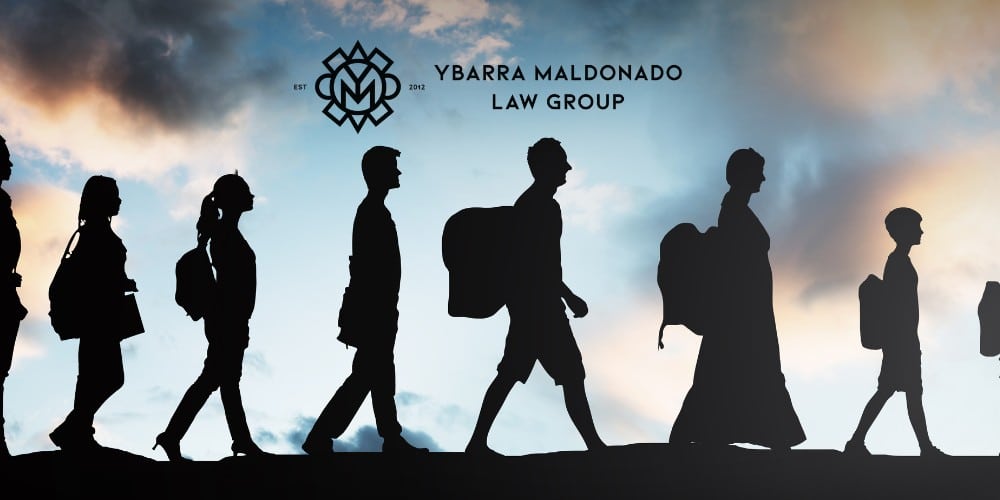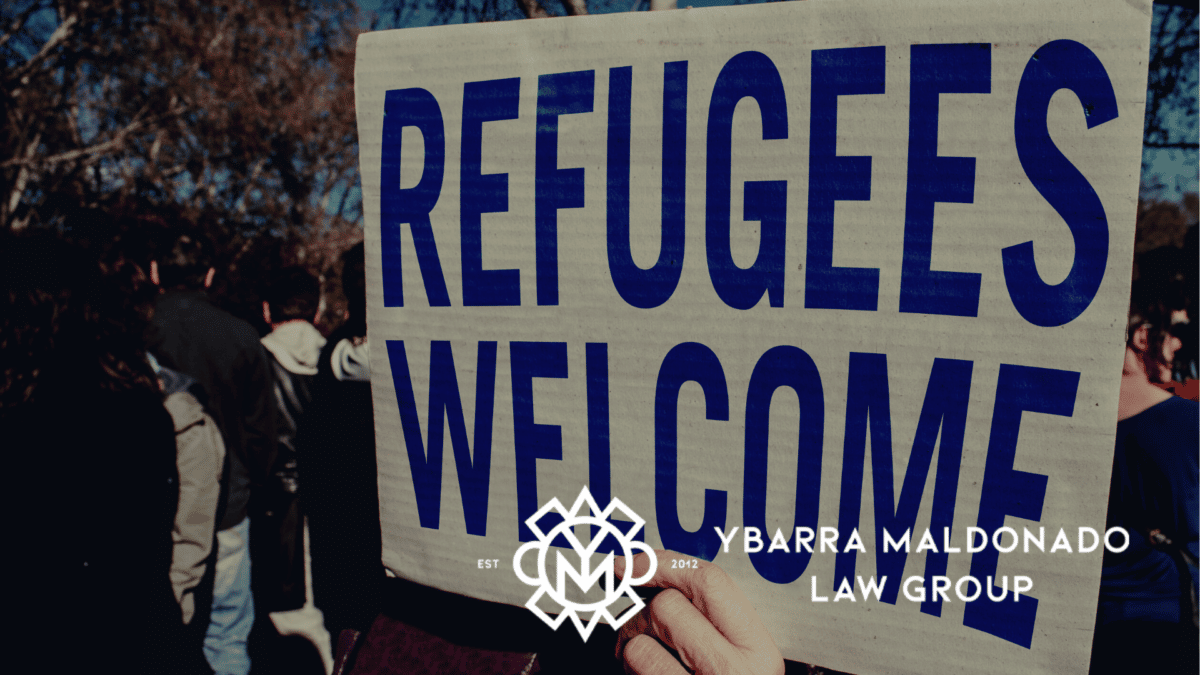Asylum and Refugee
Home » Practice Areas » Phoenix Immigration Lawyer » Phoenix Asylum Lawyer
DON’T HESITATE TO REACH OUT TO US!
Our Law Firm is committed to becoming the best Law Firm for Latino, migrant, and Spanish speaking communities in Arizona.
Phoenix Asylum Lawyer

Nations have been granting asylum, or some form of it for centuries. The modern international and United States Asylum laws are a product of practices stemming from World War II. The lack of clearly defined asylum laws during the mid twenty-first century had dire consequences. Consequently people fleeing Nazi Germany were turned back, resulting in their tragic death. Before World War II, the United States experienced a nativist movement. This resulted in the Immigration Act of 1924. This lowered per-country immigration quotas. A passenger ship of 900 Jewish refugees fleeing Nazi Germany were not permitted to enter the United States. More than half of those passengers died shortly after returning to Germany.
After World War II, a coalition of over 140 countries formed the United Nations High Commissioner for Refugees (UNHCR). It was designed to help refugees around the world. The United States joined this group in 1967. Because the United States signed the 1967 protocol, and because of its own immigration laws. The United States has legal obligations to protect individuals that qualify as refugees.
The United States Refugee Act of 1980, signed into law by President Jimmy Carter, mandated a legal asylum practice in the United States. The process changed slightly with each following administration. However, the Trump Administration made radical changes that reversed many of the initiatives of the original act.
Our Phoenix immigration lawyers are ready to help those seeking asylum and refugee status.
What Is Refugee Asylum?
Asylum is a type of protection the United States government grants to foreign nationals. It is for individuals who are unable or unwilling to return to their home country.
The reason must be for fear of persecution based on one of the following reasons:
- Race
- Religion
- Nationality
- Membership in a particular social group
- Political opinion
- Sexual orientation
Those granted asylum may lawfully live and work in the United States. After living in the United States with asylum status, individuals may apply for permanent residency, also known as a Green Card.
Who is Eligible for Refugee Asylum?
If you come from a country where you underwent persecution, or fear you will be persecuted if you return, you might be eligible. Accordingly, you can seek refugee protection in the United States (if you’re currently living outside of the United States). If you are currently in the United States, you can seek Asylum.
Additionally, if you are a principal refugee or asylum seeker, you may petition for a family member to become a derivative asylee or refugee. Through this route, you must file Form I-730, USCIS relative petition.
Can an Asylee Go Back to The Home Country?
Sometimes, the United States government might try to argue that your country is safe to return to. In this case, you might still be eligible to apply for asylum in the United States. Accordingly, this is because of “humanitarian asylum.” This grants asylum status to those that can demonstrate “compelling reasons for being unwilling or unable to return to the country arising out of the severity of the past persecution.” It also grants status if “there is a reasonable possibility that the individual may suffer other serious harm upon removal to that country.”
Examples of this include:
- Everything you owned in your country or origin was destroyed.
- You would face severe emotional grief or trauma upon returning.
- Finally, even if you didn’t face persecution, you would remain a social outcast.
If you have been granted asylum or refugee status, it is in your best interest to apply for a green card as soon as you are eligible. This will protect you against removal proceedings if conditions improve in your country of origin. Many people undergo reasonable fear interviews before they can obtain asylum. These interviews can be intimidating, but having an immigration attorney helps tremendously.
Asylum Processing

What is Affirmative Asylum Processing?
If an individual is not in removal proceedings, he or she may apply for asylum through U.S. Citizenship and Immigration Services (USCIS). The applicant participates in an interview at their local USCIS office. In the event that USCIS does not approve the asylum application, or the applicant does not have legal immigration status, he or she is referred to immigration court for removal proceedings. From there, the applicant may renew their asylum request through the defensive process and argue their case to a judge.
A person can apply for asylum through an affirmative application and defensive application. “Affirmative application” is when you submit your application directly to USCIS. It does not automatically place you in removal proceedings. This route involves preparing and submitting the required USCIS forms. Next, you will participate in an interview at your local USCIS office. Your eligibility will be based on your written application and on the information you provide during your interview.
What is Defensive Asylum Processing?
Defensive Asylum Processing is for individuals that are in removal proceedings. In this case, individuals file an application at the Executive Office for Immigration Review (EOIR). Next, they may argue their case to an immigration judge. In more basic terms, it means that applying for asylum is done as a defense against removal from the United States. EOIR does not provide court-appointed counsel for individuals. This is unlike in the criminal justice system, in which anyone accused of a crime is provided representation. Even if they are unable to hire an attorney on their own, EOIR will not provide one.

What is a Refugee?
A refugee is a displaced person who crossed national borders by force and cannot return home safely. It is similar to asylum. Refugees must apply for refugee status in the United States before they arrive. Refugee status is similar to asylum but is obtained by a person who is currently outside the country.
Who is Eligible to Become a Refugee?
To be granted refugee status, and later asylum, you must meet the following criteria:
- You are currently located outside of the United States.
- There is no reason you would be considered “inadmissible” in the United States.
- The reason you are being persecuted is because of one of the following:
- Race
- Religion
- Nationality
- Membership in a particular social group
- Political opinion
- Sexual orientation
Refugees in the United States that want their families to join them can file Form I-730. This is also called Refugee/Asylee Relative Petition. It is for spouses and unmarried children under the age of 21.
What is the Difference Between Asylum and Refuge Seeker?
People granted asylum are present in the United States when they apply. Refugees request refugee status before entering the United States. Both Asylum and Refugee status allow an individual to stay in the United States indefinitely. Alternatively, they may stay until the conditions in their home country improve. They may apply for a work permit once USCIS approves their status. They may apply for a Green Card after one year, and citizenship after five years.
How Do You Apply for Asylum or Refugee Status?
You must prove that you meet the definition of a refugee according to 8 U.S.C. § 1101. This means that you have to show that you are the victim of past persecution or fear persecution in the future. This can be difficult to prove. It’s helpful to understand what each requirement means, and how the government defines some of the terminology in the law. An experienced asylum and refugee immigration attorney at the Ybarra Maldonado Law Group will be able to build your case.

What is Persecution?
First of all, United States Immigration laws do not specifically list types of persecution. The one exception is in part of a refugee definition. There, it says that persecution includes people that have undergone or fear a “coercive population control program.” This could mean genocide or forced abortion and sterilization.
Few people who apply for asylum fit into this category. Generally, persecution means the infliction of suffering or harm, as well as threat to life and freedom. The United States does not consider harassment as persecution. However, the United States classifies the following acts as persecution:
- Death threats
- Torture
- Imprisonment
- Constant surveillance
- Pressure to join a group that engages in illegal activity
- Interference in someone’s privacy, family, home, or communication
- Discrimination in practices surrounding housing, education, and passport issuance
Economic hardship is not reason enough to prove eligibility for asylum or refugee status. The central reason for your persecution must tie to your race, religion, nationality, membership in a particular group (including sexual orientation) or political opinion. You need to show a pattern or practice in which people in a similar category as you face persecution. After that, you must show that you belong to that group, or might be identified with that group. The threat against you must not be solvable by moving to a different part of the country; it must be a nationwide problem.
Even if you haven’t suffered persecution in the past, you may still qualify for political asylum or refugee status if you fear future persecution. This, however, must be substantiated by evidence.
The persecution does not need to come from the government or authorities. It is possible to get asylum or refugee status if you face persecution by guerillas, tribes, paramilitary groups, or vigilantes.
What is a Well-Founded Fear?
There are two types of fear that you must prove:
- Subjective Fear: This means that you truly do fear returning to your country of origin
- Objective Fear: In this case, you can provide evidence based on objective sources. They must prove that any reasonable person in your position would fear persecution.
Having an experienced team of Phoenix immigration lawyers on your side can help your immigration case immensely. Visit our page on Reasonable Fear vs Credible Fear to learn more.
Phoenix Asylum Lawyers
Immigration Courts do not provide attorneys to asylum and refugee claimants. Considering that it is difficult to prove persecution, hiring an attorney to build your case for asylum is critical. If you are afraid to return to your country of origin, contact us online or by calling 602-910-4040. Our experienced Arizona Asylum and Refugee Lawyers provide confidential consultations. Get the help you need today.
TELL US YOUR STORY.
DONT WAIT. LET OUR LAW FIRM HELP YOU.

